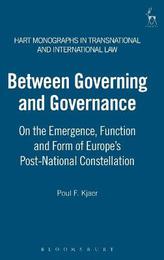
|
Between Governing and Governance: On the Emergence, Function and Form of Europe's Post-National Constellation
Hardback
Main Details
| Title |
Between Governing and Governance: On the Emergence, Function and Form of Europe's Post-National Constellation
|
| Authors and Contributors |
By (author) Poul F Kjaer
|
| Series | Hart Monographs in Transnational and International Law |
|---|
| Physical Properties |
| Format:Hardback | | Pages:212 | | Dimensions(mm): Height 234,Width 156 |
|
| ISBN/Barcode |
9781849460262
|
| Classifications | Dewey:341.2422 |
|---|
| Audience | | Professional & Vocational | | Tertiary Education (US: College) | |
|---|
|
Publishing Details |
| Publisher |
Bloomsbury Publishing PLC
|
| Imprint |
Hart Publishing
|
| Publication Date |
5 February 2010 |
| Publication Country |
United Kingdom
|
Description
This book explains the emergence and functioning of three forms of governance structures within the context of the European integration and constitutionalisation process: comitology, (regulatory) agencies and the Open Method of Co-ordination. The point of departure is the insight that the intergovernmental/supranational distinction, which most theories of European integration and constitutionalisation rely on, has lost its strength. A new paradigm of EU research is therefore needed. Against this background it is suggested that the distinction between governing and governance provides a more appropriate basis for analysing the phenomenon of integration and constitutionalisation in Europe. The distinction between governing and governance allows for an understanding of the EU as a hybrid consisting of a governing dimension, characterised by legal and organisational hierarchy, and a governance dimension which operates within a network form characterised by legal and organisational heterarchy. The function of governance structures is to ensure the embeddedness of the governing dimension in the wider society. Instead of representing contradictory developments, the two dimensions are therefore mutually constitutive in the sense that more governing implies more governance and vice versa. These theoretical insights are illustrated through two detailed case studies which respectively reconstruct the operational mode of the Open Method of Coordination within EU Research & Development Policy and the regulatory system for the EU chemicals market (REACH). The book is inter-disciplinary in nature and incorporates insights from law, political science and sociology.
Author Biography
Poul F Kjaer is Research Fellow at the Cluster of Excellence: Formation of Normative Orders, Goethe University Frankfurt am Main.
Reviews... Kjaer's work shows an awareness of the concurrent role and weight of political, sociological and legal approaches in the study of the EU's development. This brings methodological sensitivity and a greater appreciation of the intricacies of European integration. This book is an account of the ways in which the radicalized functional differentiation of late modernity shapes the (governance) structures of the EU, and provides European integration with a powerful engine. It is also an example of the promise that a sociologist-functionalist interpretation of governance structures holds, one that will be all the finer if it remains open to the paradigmatic contaminations that it itself generates. Sarah Kahn-Nisser and Gianluigi Palombella Transnational Legal Theory 2010 1(4) The most important reasons to commend this book ... must be its ambition and scope, in both methodological and substantive terms...Kjaer's book does justice to the multi-faceted nature of this concept by relying on insights from law, political science and sociology. This makes for refreshing reading, as conventional assumptions are questioned or developments placed in a different light. Kjaer addresses all three forms of governance prevalent within the European Union and systematically explains their characteristics and functioning. This enables him to capture important similarities between comitology, agencies and the Open Method of Coordination ... which in turn provides the foundation for the governing-governance distinction that is at the heart of the book. And it is true that this distinction makes a worthwhile contribution to EU scholarship, with the book correctly identifying governance as a concept whose potential has not yet been fully unlocked for analyzing the European Union. Kjaer's book is certainly thought-provoking, even though the reader may not necessarily agree with all the arguments he puts forward. And that, in my opinion, is what good books are all about. Maartje de Visser European Law Review Volume 36, 2011 Kjaer's work ... constitutes a vital new stance within this conceptual milieu. It stands as a very serious intervention in contemporary legal, political, and social theory, and few readers are likely to finish reading it without finding their theoretical attitudes to government subtly modified and refined. Chris Thornhill Journal of Law and Society November 2010 This book is a challenging contribution to the literature on the reasons and dynamics of the European integration process. Edoardo Chiti Common Market Law Review Volume 48, Issue 1
|